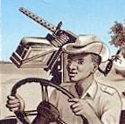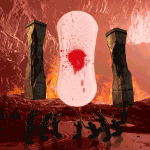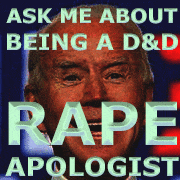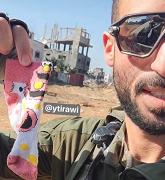|
Kind of burying the lede there, but yep.
|
|
|
|

|
| # ? May 23, 2024 12:31 |
|
nigerian facebook is just a giant clickbait article
|
|
|
|
i say swears online posted:nigerian facebook is just a giant clickbait article + drug market
|
|
|
|
https://www.youtube.com/watch?v=ttgP_WJ3zqI
|
|
|
|
i say swears online posted:nigerian facebook is just a giant clickbait article I had to unfollow dozens of Nigerian Twitter people like two weeks ago and am now blissfully removed from the election
|
|
|
|
Darth Walrus posted:Sorry, this one's more on the horrifying end of the scale. Remember the African AIDS pandemic of the Eighties and Nineties? Seems like it might have been given a little helping hand by a pro-apartheid South African mercenary group under the guise of medical research.
|
|
|
|
Sounds entirely plausible. That said, Afrikaner militias did not exactly have a great reputation for military competence. https://en.wikipedia.org/wiki/1994_Bophuthatswana_crisis#AWB_involvement
|
|
|
|
am I mixing up SA with rhodesia or was there one group that was obsessed with the idea of fighting like tribal warriors and would run around with guns completely naked
|
|
|
|
KOTEX GOD OF BLOOD posted:am I mixing up SA with rhodesia or was there one group that was obsessed with the idea of fighting like tribal warriors and would run around with guns completely naked https://www.youtube.com/watch?v=ZRuSS0iiFyo
|
|
|
|
Grouchio posted:Actually Liberia
|
|
|
|
Today in "giant loving massacres getting reported pretty much nowhere":AP posted:More than 1,200 killed in Mali last year, says report
|
|
|
|
the nigerian elections were supposed to start right about this hour but they've been delayed a week. things are getting a little chaotic
|
|
|
|
Hypothetically, if Nigerians were to suffer a migration crisis, where would most of them go?
|
|
|
|
Grouchio posted:Hypothetically, if Nigerians were to suffer a migration crisis, where would most of them go? VVV Yeah Canada and England for the international destinations. Maybe Ghana for those who can sail away but want to stay in Africa. Toplowtech fucked around with this message at 08:58 on Feb 17, 2019 |
|
|
|
Grouchio posted:Hypothetically, if Nigerians were to suffer a migration crisis, where would most of them go? funny you should ask! after #election, #canada was the number 2 twitter hashtag from posts in nigeria if buhari is re-elected, especially under dubious circumstances, you will see increased migration from the former biafra areas
|
|
|
|
nothing says nigerian-us solidarity like threatening to move to canada after your preferred candidate loses a presidential election lol
|
|
|
|
Wait, holy gently caressAFP posted:Nigerians who were surprised when the country's presidential election was postponed on Saturday might suffer a second shock when they learn the cost, some economists and business leaders say.
|
|
|
|
KOTEX GOD OF BLOOD posted:Wait, holy gently caress
|
|
|
|
yeah they don't mean the cost of ballot printing, they mean the lost economic activity. election day is a day when everything shuts down, and like the article said, people need to travel. that's expensive for someone making $300/month
|
|
|
|
https://www.foxnews.com/world/in-nigeria-vote-armed-vigilantes-work-to-keep-the-peace
|
|
|
|
it's a shitshow! buhari crushed it, PDP turnout way down. nobody in the south-south believes the result. things could get bad
|
|
|
|
KOTEX GOD OF BLOOD posted:Wait, holy gently caress I mean, apart from the "investor confidence" angle, if 100 million or so people suddenly stop being economically productive for two days, that's gonna also have a pretty big impact. Back of the envelope, Nigeria's GDP is about $380bil, so two days of the country shutting down could easily rack up a billion or two in lost economic activity.
|
|
|
|
KOTEX GOD OF BLOOD posted:Wait, holy gently caress It's accounting for the lost economic productivity from people having two days off. It probably overestimates the damage to Nigerians' economic well-being because it doesn't factor in the benefit people get from having a day off, which would partially counteract the loss of productivity. Time spent not working still has quantifiable economic value since workers can (to some extent) 'spend' on leisure time by taking time off.
|
|
|
|
Losing 2 days work won't completely blank those 2 days either - some things may tick over and still return partial benefit even without a worker there for a short period of time. A farmer not tending his crops for a day may not result in losing a proportionate amount of his harvest or technical support worker in a call center not being able to offer support to users may not invalidate the companies products etc etc Still very bad obviously.
|
|
|
|
This is bad and seems like it has the potential to get much worse. https://www.scientificamerican.com/..._&sf209183444=1 quote:More than 900 people have been sickened by the Ebola virus since it began spreading in the Democratic Republic of the Congo (DRC) in early August. The outbreak, now the second-largest ever recorded, shows no sign of slowing—fuelled, aid workers and government officials say, by a toxic cocktail of violence and mistrust.
|
|
|
|
This is horribly bad because the DRC is literally one of few places in the world where leaders would let the disease spread to get ride of political opponents, region by region. And there are a few regions nearby where the same cynical strategy would happen too. Say what you want about Western Africa, central africa dictators always manage to be worse and Ebola in their area is going to be a nightmare.
|
|
|
|
how many 'dictators' are left in west africa anyway?
|
|
|
|
Another Ebola treatment center attacked https://edition.cnn.com/2019/03/10/health/ebola-drc-congo-who-death/index.html
|
|
|
|
i say swears online posted:how many 'dictators' are left in west africa anyway? Most of west africa is considered "partly free" those days, freer than north africa (with the exception of Tunisia) at least and certainly better than central africa.
|
|
|
|
So Tshisekedi is refusing to seat the newly elected FCC senators. Maybe he is actually going to try and prevent Kabila from continuing to control the country? Maybe?
|
|
|
|
https://twitter.com/ikushkush/status/1115353785642172418 Huge crowds on the streets of Kartoum
|
|
|
|
Man I hope they keep this up after what happened in Algeria, although no illusions that Bashir will give up as easily.
|
|
|
|
Well that post aged poorly.
|
|
|
|
This loving month man.
|
|
|
|
Despite the outbreak worsening, it has not been declared an international health crisis. https://edition-m.cnn.com/2019/04/12/health/ebola-public-health-emergency-congo-africa-bn-intl/index.html?r=https%3A%2F%2Fwww.google.com%2F
|
|
|
|
The dead count is getting around 800 but "everything is fine!".  For reference the West African outbreak killed around 1200+ people in Guinea alone and around 4000+ people total if you add Liberia. Someone must be really (over)confident in its ability to prevent the spread of the disease. Toplowtech fucked around with this message at 07:09 on Apr 15, 2019 |
|
|
|
Super informative article about the Sudan situation by Alex de Waal: https://africanarguments.org/2019/04/12/cruel-april-sudan-spring/ e: Also here are some profiles of the Sudanese military captains from Reuters. KOTEX GOD OF BLOOD fucked around with this message at 16:27 on Apr 16, 2019 |
|
|
|
So South Africa has a general election coming up, and I'll actually be back in the country visiting, so I can vote this time! In related news, the Canadian Housing Bubble thread just posted this list of the world's most expensive housing markets, and Cape Town was on that list: https://www.cbreresidential.com/uk/sites/uk-residential/files/property-info/FINAL%20REPORT.pdf Quoting what I posted there: Lead out in cuffs posted:Those Cape Town numbers are utterly bonkers. The salaries there are about a third or less what they are in Vancouver. The average (not median) household income was about CAD$16K/year in 2011, and I doubt it's much higher now. One fifth of the city's population are still living in literal tin shacks. That the median property price is 2/3 that of Vancouver's is mind-boggling. Friends have been saying the same thing -- prices of food and luxury goods are approaching those in North America and Europe, but the salaries aren't increasing. I don't even know how people on the low end of the income scale are affording to buy staple foods.
|
|
|
|
This thread seems pretty dead but I thought I would let everyone know that South Africa is currently having an election right now and at the moment it looks like the ANC is going to get less than 60% of the votes which is kind of unheard of. EFF is underperforming/performing just right depending who you ask, and the DA is currently coming in second place and have got a lock on the Cape. https://www.africanews.com/2019/05/09/live-south-africa-may-8-general-elections-web-coverage//
|
|
|
|

|
| # ? May 23, 2024 12:31 |
|
Madkal posted:This thread seems pretty dead I was going to post more but people got annoyed by me.
|
|
|


















